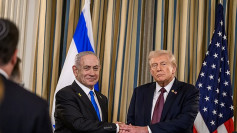Russian President Vladimir Putin has vowed to "respond" if the United Kingdom goes ahead with plans to provide Ukraine with weapons containing depleted uranium. Putin alleges that some of the munitions Britain intends to deliver to Ukraine include armor-piercing rounds made with depleted uranium. He cautioned that if Kyiv receives these nuclear component-containing weapons, Russia will retaliate.
"The United Kingdom... announced not only the supply of tanks to Ukraine but also shells with depleted uranium. If this happens, Russia will be forced to respond accordingly, given that the West collectively is already beginning to use weapons with a nuclear component," Putin stated.
These remarks came after Putin met with Chinese President Xi Jinping to discuss a "new era" in their bilateral relations. Sergei Shoigu, the Russian Minister of Defense, warned that the world is only a few "steps" away from a nuclear catastrophe, noting that "there are fewer and fewer left."
Russian Foreign Minister Sergey Lavrov also cautioned that Britain "has lost its bearings," and supplying such munitions would be "a step toward accelerating escalation." Depleted uranium is employed in weaponry as it can penetrate armor and tanks, but it can pose health risks if the resulting dust infiltrates people's vital organs and food sources.
In response to a question about the uranium-based ammunition, Shoigu said, "Naturally, Russia has something to answer this with." Both the British Defense Ministry and the White House dismissed Russia's allegations, although the ammunition does carry some risks, despite not being a nuclear weapon.
Depleted uranium is a byproduct of the process used to produce enriched uranium for nuclear fuel and bombs. It is denser than lead, making it an ideal projectile material, while being significantly less potent and incapable of causing a nuclear reaction. According to RAND nuclear expert and policy researcher Edward Geist, the material's density and momentum enable it to "keep going through the armor" and generate enough heat to cause a fire.
The White House denounced Russia's allegations as misinformation. "Make no mistake, this is yet another straw man through which the Russians are driving a stake," said U.S. National Security Council spokesperson John Kirby. The International Atomic Energy Agency (IAEA) considers depleted uranium primarily a toxic chemical, rather than a radiation risk, with potential harm to the kidneys if particles enter the bloodstream.
In related news, two of Putin's top battle commanders, Yevgeny Prigozhin, leader of the private Wagner group, and Shoigu, engaged in a bitter dispute while Putin sought urgent military assistance from China's Xi. Prigozhin publicly warned Shoigu that failure to act promptly could lead to the loss of all military gains made in Bakhmut. This feud escalated when Prigozhin insulted Shoigu's fitness blogger son-in-law and Shoigu reportedly disconnected Prigozhin's phone lines to the military's top leadership.






